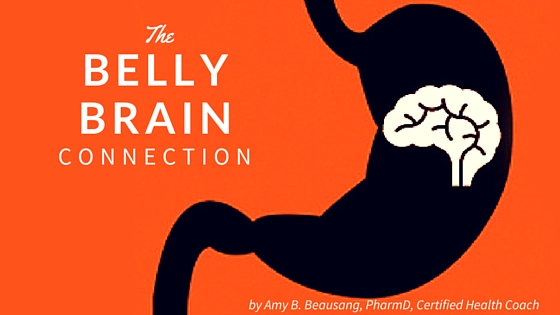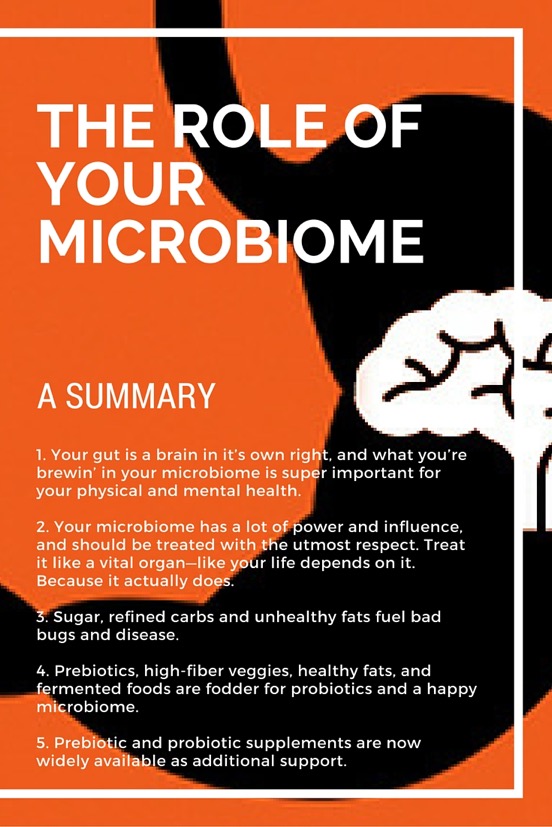by Amy Beausang, PharmD and certified health coach
Ever notice that many common expressions contain the word “gut”? Phrases like “trust your gut”, “gut instinct”, and “gut feeling” connote that sometimes you just KNOW something is right, even if you don’t know WHY. It’s almost like your gut is some kind of brain or something.
Not almost. Your gut actually is a kind of “brain”. In fact, scientists often refer to the gut as “the second brain”. And the impacts of this second brain on everything from digestion to dementia are becoming vividly clear and largely dependent on…wait for it:
GUT BUGS. Yep, turns out your second brain contains some 100 TRILLION microbes, mostly bacteria. And you didn’t think anything could make our national debt look small—ha! What’s more, these gut bugs—now fashionably referred to as “the microbiome”—play a big role in your ability to:
- Lose weight and keep it off
- Fight infection
- Digest food and absorb nutrients
- Control inflammation, a major culprit in many chronic diseases
- Be happier and handle stress
But I have some bad news. Our belly bugs tend to be all out of whack, thanks in part to massive overuse of antibiotics. Antibiotics—even when they are appropriately prescribed—may eradicate the bugs that are making us sick, but also lots of the good guys, too. Ever gotten a yeast infection after a round of antibiotics? This pleasantry occurs because antibiotics don’t discriminate—the good guys die, too, and those non-susceptible nasties shout “PARTY IN DA HOUSE!” and just proliferate like crazy.
But antibiotics aren’t entirely responsible for our imbalanced bellies. The standard American diet (SAD) of low-fiber, high sugar, highly-processed food is feeding our highest obesity rates in history while paradoxically starving our microbiomes. Why is this and why should you care?
In his latest awesome book, Brain Maker: The Power of Gut Microbes to Heal and Protect Your Brain—For Life, board-certified neurologist Dr David Perlmutter tells us (and repeats it because it’s IMPORTANT, people!) that “Diet has the dominant role in shaping our gut microbiota, and changing key populations may transform healthy gut microbiota into a disease-inducing entity.”
Ahem. In normal, non-doctor speak: “Those belly bugs you got brewin’ up in there are largely a result of what you put in your mouth, so when you eat or drink sugar, refined carbs, and highly-processed food, you give the bad bugs license to thrive.” Why is this a big deal? Becuase an imbalanced microbiome is now linked to a host of maladies including obesity, type 2 diabetes, depression, anxiety, Alzheimer’s, autism spectrum disorder, eczema, asthma, multiple sclerosis, rheumatoid arthritis, Crohn’s disease, ulcerative colitis, and atherosclerosis.
On the flip side, enjoying a variety of high-fiber veggies, healthy fats (avocados, olives, nuts, chia seeds, pumpkin seeds to name a few), and fermented foods (such as live-cultured yogurt, kefir, tempeh, kimchi, sauerkraut, and kombucha) can help your probiotics flourish. The good bugs love this stuff, and incorporating these foods into your everyday life will give you love in return. If you need a little extra help in the happy bug department, supplementing with probiotics is a widely available option. To ensure a smart purchase, Dr Perlmutter recommends checking with a reputable store and choosing supplements that contain at least the following probiotic species:
- Lactobacillus plantarum (immunity and inflammation regulator)
- Lactobacillus acidophilus (also found in yogurt, yeast infection fighter and healthy cholesterol maintainer)
- Lactobacillus brevis (brain bug extraordinaire)
- Bifidobacterium lactis (aka animalis; digestive comforter and immune booster)
- Bifidobacterium longum (antioxidant, free radical scavenger, anxiety reducer)
I would be remiss in my duty if I didn’t mention prebiotics. Prebiotics are “fuels” that promote probiotic growth. Dandelion greens, garlic, leeks, onions, and asparagus are great sources. AND, you can also use a prebiotic supplement daily to nurture your microbiome. I settled on a product made from acacia fiber that easily mixes with water. I purposely avoided psyllium fiber because it can cause bloating, cramping, and gas. Got no time for that.
So, if you’re a reverse reader, here’s the 5-point summary:
Wishing you happy bellies,
Amy



 RENTALS
RENTALS ACTIVITIES
ACTIVITIES Menu
Menu ABOUT
ABOUT CONTACT
CONTACT